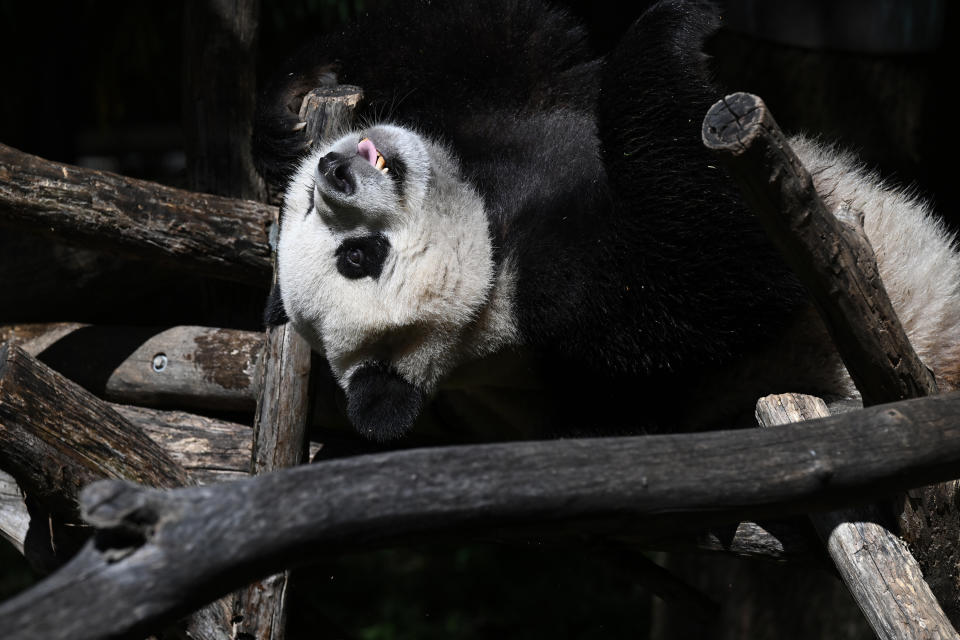A family visited the giant pandas for more than 40 years. Now they must say goodbye.
Cyndy Taylor tapped her cousin, Mia Waddy, on the back and pointed at the black-and-white creature in a tree above them. They arched their backs, tilted up their chins and waited for Xiao Qi Ji to make a move.
"Oh, here we go," Taylor said. "He is coming down."
Taylor and Waddy gazed intently as Xiao Qi Ji, one of the National Zoo's three giant pandas, slinked down the branches. Waddy, 49, smiled and placed a hand on Taylor's shoulder.
"I think he is going to give us a roll," Waddy said.
The 3-year-old giant panda sluggishly tumbled down a hill, his belly sunnyside up. The two women laughed.
Taylor, 52, and her cousins were raised to be zoo zealots. The family comes from different parts of New York and has long supported conservation efforts, they said. When Taylor's father, who was a history teacher, learned that China had presented the United States two pandas as gifts, he urged the family to see Ling-Ling and Hsing-Hsing. Starting in 1981, family members regularly traveled on winter holidays and summer breaks to see Washington, D.C.'s pandas. Some of Taylor's cousins moved to Springfield, Va., giving the family a home base for panda visits. After their first visit, Taylor said, they were hooked.
By the '90s, most of them had moved to Northern Virginia. Their panda love spans three generations, spurring family trips to the zoo at least once every season. Taylor, who lives in Fairfax County, aims to see the bears once a week.
They watched all eight pandas that have lived in the zoo since it launched its panda program in 1972. They celebrated births and birthdays as four cubs were born and raised.
But soon, the family's 42-year tradition will come to an end.
The zoo's three giant pandas will be heading back to China before Nov. 15 as their loan to the United States expires. The departure of Mei Xiang, 25, Tian Tian, 26, and their son Xiao Qi Ji will leave the capital panda-less for the first time in 23 years.
"They are going to be loved in China," Taylor said. "They're going to be loved and they'll get great care. I'm not worried about them. I'll just miss them."
The family's frequent visits to the bears reflect a deep-rooted love felt by many locals. When pandas first came to Washington, D.C., a 1972 Washington Post article said that visitors lined up at their enclosure, the Panda Palace, at a rate of up to 1,200 people per hour - more than 8,000 total on the first day they were on display. Cassandra Hetherington, director of Cleveland Park Main Street, a business group for the adjacent neighborhood, remembers looking out her apartment window in 2000 to see Tian Tian and Mei Xiang arriving at the zoo on a FedEx truck.
"The pandas have really been in the heart of Washington, D.C., for decades, especially in Cleveland and Woodley Parks," Hetherington said. "When we think of our zoo, that's the animal most of us think of."
Taylor's family starts every zoo visit at the panda enclosure before fanning out across the park. Her aunt, Martje Jackson, watches first-timers as they smile and point at the pandas. Nathan Frey, Taylor's 15-year-old godson, said he spends a few minutes with the pandas before beelining for the reptile house. Tish Frey, Taylor's cousin and Nathan's mom, lingers behind, watching the pandas as they line up their bamboo before taking a bite.
Taylor said she liked it best when the enclosure was quiet and the viewing area was empty. The silence helps bring back memories.
Like in 2017, Taylor said, when she was facing the glass and looked up to find Bei Bei, whose paws were pressed in the same spot where her hands rested. Taylor moved her hands down the glass, and Bei Bei's paws followed. She held her breath while their eyes locked.
Or a year earlier, when her mother, Johanna Taylor, leaned near the glass and found herself face to face with Bao Bao, the sole female cub born to Mei Xiang and Tian Tian. They were inches apart, and the glass barrier felt almost invisible, Johanna said.
"It took my breath away. Pandas always seem to follow Cyndy," said Johanna, 83, smiling at her daughter. "But that day, I think she followed me."
In 2016, the panda-viewing area was the last place Cyndy saw her brother, Andy, outside of a hospital. Andy, his wife and children, who were living in Florida, came to the area and joined Cyndy, Johanna, the Freys and Jackson on their journey to the zoo. When Bei Bei had to go for emergency surgery to remove partially chewed bamboo from his intestines, the family watched Bao Bao, Tian Tian and Mei Xiang play.
Before they left, Cyndy said, Andy bought her a panda mug from the zoo gift shop and said he understood why she loved them so dearly. Cyndy said she told her brother that he would see Bei Bei next time. Andy died the next year.
"You think you're going to have a million more times," Cyndy said, later adding, "For me, this is not just about seeing the pandas."
On an October afternoon, Cyndy grabbed her camera and strolled down the slope toward the bottom of Xiao Qi Ji's enclosure.
Some people travel across the country to see the pandas, she said, and she feels grateful to have been able to visit them this often. "I wouldn't trade a second," she said.
Still, tears welled in her eyes when she looked up to see shipping containers placed near Xiao Qi Ji's yard.
"They're here," she messaged her family group text chat.
Her mother replied, "Too soon."
Related Content
Malaria's deadly reach is growing
The 'new' Beatles song is perfectly fine. Which is not good enough.
Trump Jr. testifies, deflects responsibility in N.Y. business-fraud case




